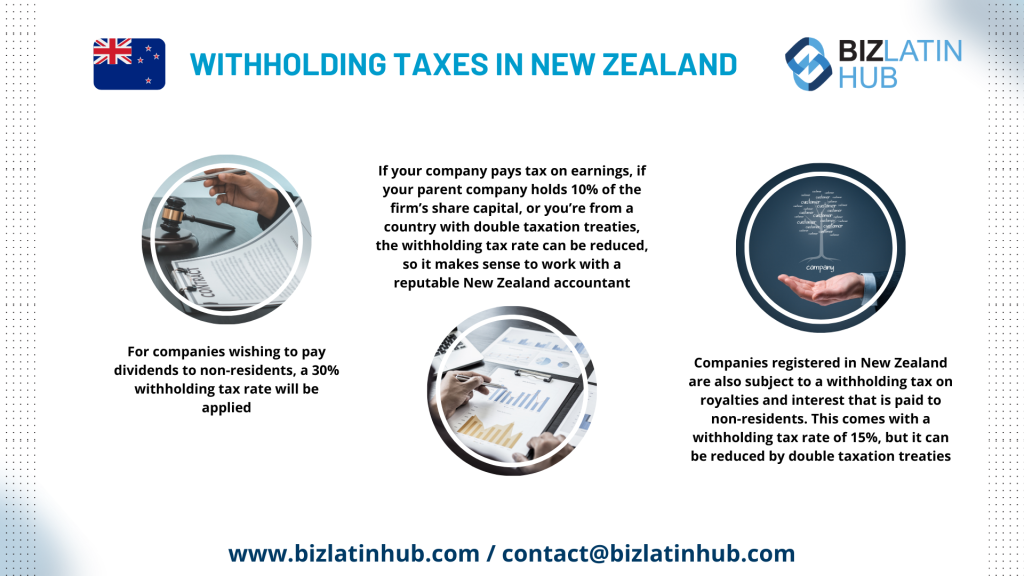New Zealand is fast-becoming an investment hotspot for international entrepreneurs looking to take their businesses to new heights. As the world becomes increasingly globalized and businesses seek opportunities outside of their home markets, entering into a country such as New Zealand offers a whole host of benefits, not least because of its free trade agreements, strong export market and unique geographical position, neighbouring the Australian economy.
However, in order to make the most out of international expansion and find success in New Zealand, you must be aware of accounting and taxation laws. Of course, working with a local accountant is critical to your long-term success, but having an understanding of the basics will give you food for thought and help you make the right investments. Below, we round up some of the most important accounting and taxation considerations in New Zealand…

Corporate Tax in New Zealand
All businesses that are resident in New Zealand must pay corporate tax on their income – both income that they make inside of New Zealand, and income they make around the world. That is why so many entrepreneurs choose to set up subsidiaries or branch offices in New Zealand to protect their overseas assets and pay tax only on New Zealand-sourced income.
The current corporate tax rate in New Zealand is 28%, and businesses must submit their tax returns on 31 March and pay provisional taxes on 15 January, 31 March, and 7 May. Earnings that are made by branch offices and subsidiaries are subject to the same 28% tax rate as other New Zealand businesses, but only on income that is generated in the country.
Look Through Companies (which allow the company to transfer income and expenditure to shareholders) do not pay corporate tax, although foreign entrepreneurs earning more than US$10,000 of foreign sourced income are no longer able to incorporate as an LTC in NZ.
For companies that generate more than US$45,000 in sales, registering for the New Zealand Goods and Services Tax (GST) is a requirement by law, and returns must be filed every month to ensure compliance. Hiring an in-house bookkeeper makes the most sense, though you may choose to outsource your New Zealand accountancy to another firm.
Finally, it’s important to mention that New Zealand businesses are able to carry forward their losses indefinitely; should you be unprofitable in your first year, you can recoup these losses in the second year and therefore receive a reduced tax bill, allowing you to break even.
Doing Business in New Zealand – Tax on Foreign Investors
As a foreign investor entering into New Zealand to add a new revenue stream to your bow, it is important that you get to grips with the incorporation process and local taxation to ensure you can operate a profitable venture in the country. First off, foreign companies in New Zealand are subject to corporate income tax laws if a majority of their shareholders are based in New Zealand (50%+).
Transactions that take place between New Zealand companies or branches are subject to transfer pricing regulations, such as transfer pricing adjustments and determining the cost of cross-border supplies in an effort to build a fair and competitive market. It is critical that you remain fully compliant with local business laws to avoid investigations, fines, or prosecution.
Withholding Taxes in New Zealand
For companies wishing to pay dividends to non-residents, a 30% withholding tax rate will be applied. If your company pays tax on earnings, if your parent company holds 10% of the firm’s share capital, or you’re from a country with double taxation treaties, the withholding tax rate can be reduced, so it makes sense to work with a reputable New Zealand accountant.
Companies registered in New Zealand are also subject to a withholding tax on royalties and interest that is paid to non-residents. This comes with a withholding tax rate of 15%, but it can be reduced by double taxation treaties. Again, keeping your books in order and working with an accountant will ensure you can minimize taxes when distributing profits to employees and sending assets and earnings back to your home country for personal or business use.
There are 40 double taxation avoidance agreements (DTAAs) in place in New Zealand, including with Australia, Austria, Belgium, Canada, Chile, China, Czech Republic, Denmark, Fiji, Finland. France, Germany, Hong Kong, India, Indonesia, Ireland, Italy, Japan, Korea, Malaysia, Mexico, Netherlands, Norway, Papua New Guinea, Philippines, Poland, Russian Federation, Samoa, Singapore, South Africa, Spain, Sweden, Switzerland, Taiwan, Thailand, Turkey, United Arab Emirates, United Kingdom, the United States of America, and Viet Nam. A treaty with Belgium has been signed but is not yet enforced, and there are a number of tax information exchange agreements in place with other jurisdictions, including Gibraltar, Jersey, Guernsey, and Niue. Ensure you understand your rights and responsibilities if your business is situated in one of these countries to minimize your tax bill and remain compliant.

Employment Taxes
As a foreign investor, the chances are that you’ll employ at least one member of staff that is native to New Zealand. Employers are responsible for making contributions to the Accident Compensation Fund at up to 3 per cent of their employees’ salaries. In addition, allowances such as housing allowance, and other fringe benefits (medical care, gym membership, etc) are subject to a 49% tax, making it expensive to offer additional perks to employees. In the majority of cases, it makes sense to offer an increased salary rather than paying for perks.
Let Biz Latin Hub Help – Accounting and Back Office Specialists
Don’t let the name deceive you – although we help businesses across Latin America through the provision of tailored back-office services, we also assist firms in New Zealand and Australia, and we’d love to help your organization, too.
To learn more about the New Zealand economy, the business opportunities to form a company in New Zealand, and how you might take advantage of these political shifts, please contact us today.






